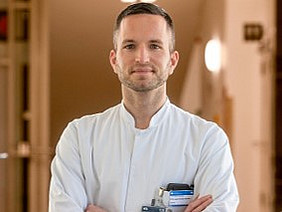At Klinikum rechts der Isar of the Technical University of Munich (TUM), antibodies have already been successfully used for months in patients hospitalized with COVID-19. Now the therapy is also being expanded for outpatient treatments.
"With the approval by the European Medicines Agency (EMA) on November 12, the neutralizing antibodies can now be widely used at an early stage of the disease," say Dr. Christoph Spinner, infectiologist and pandemic officer at Klinikum rechts der Isar, and his colleague, Dr. Jochen Schneider, who heads the new COVID-19 outpatient clinic for monoclonal antibody therapy at the university hospital.
Therapy makes sense for many people
In view of the currently rapidly increasing number of patients, especially in Bavaria, this therapy makes sense for many people and is intended to be made widely available as soon as possible.
In order to successfully combat the pandemic together, the physicians at Klinikum rechts der Isar would also like to share their expertise and experience with colleagues from other hospitals.
The therapy - which, by the way, former U.S. President Donald Trump also received due to his COVID-19 disease - basically works like a passive vaccination. "Neutralizing antibodies produced in the laboratory can inactivate the SARS-CoV-2 virus, in other words de facto checkmate it," explains Spinner.
Therapy must begin early
According to Schneider, patients tolerate the single-dose therapy very well. Relevant side effects are extremely rare. The antibodies, which are administered intravenously or subcutaneously, are designed to prevent the viruses from entering human cells and thus stop the virus from replicating. However, it is crucial that the antibodies are administered within the first seven days after the onset of symptoms, either as an outpatient or as an inpatient in the clinic. This is the only way they can develop their full potential effect.
If they are administered later, the efficacy is no longer useful. Studies have shown that it is the overactive immune system that is responsible for the severe courses of the disease, not SARS-CoV-2 itself.
Passive vaccination also as prevention
People with chronic diseases or immune deficiencies could particularly benefit from antibody therapy, as they often do not respond sufficiently to active vaccination - but still have a high risk of suffering a severe COVID-19 course.
The therapy could even be used prophylactically or immediately after contact with SARS-CoV-2, which could be an important protection for chronically ill people in particular, for example as a contact person of a person living in the household who has just tested positive. However, the legal framework still needs to be adapted for the preventive use of the therapy.
Further information can be found at:
Antibody Center: Innere Medizin II am Klinikum rechts der Isar in München
In addition, the BR podcast series "Corona-News with Dr. Christoph Spinner", hosted by Jeanne Turczynski, provides information about antibody therapy and other topics related to COVID-19 (in German only).

